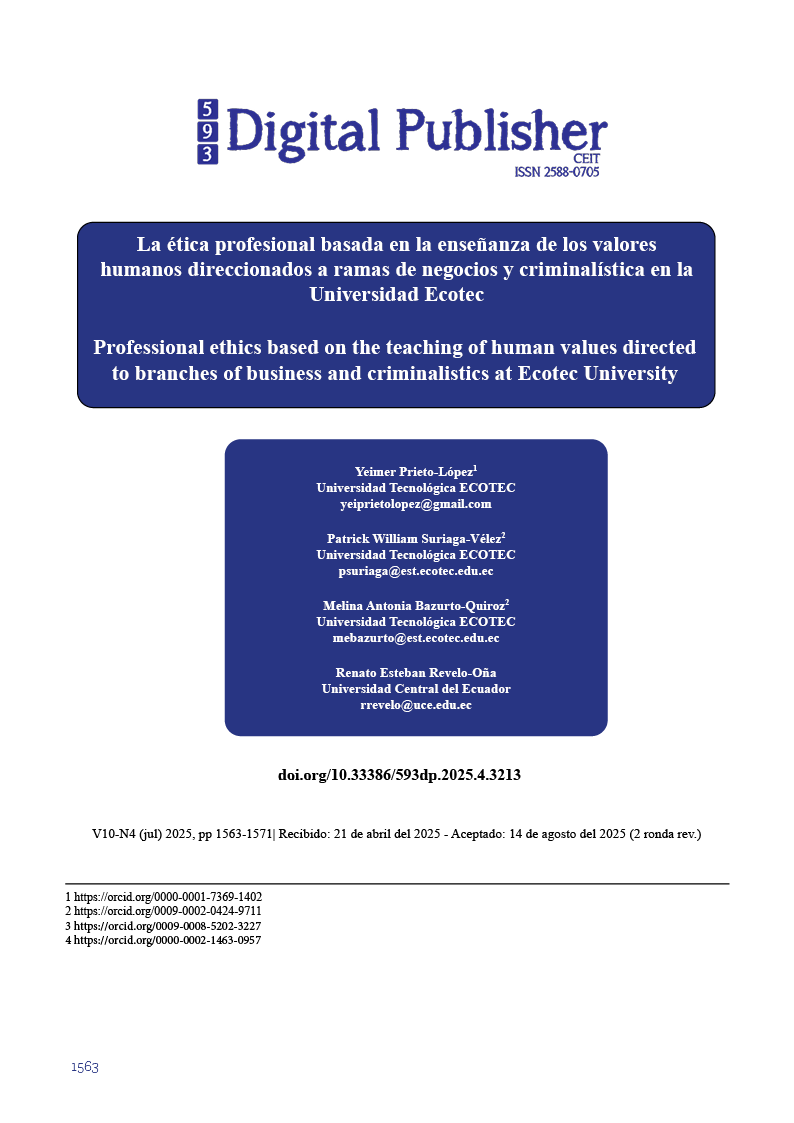Professional ethics based on the teaching of human values directed to branches of business and criminalistics at Ecotec University
Main Article Content
Abstract
This research analyzes the relationship between ethics, criminology, and human values in university education, focusing on the case of Universidad Ecotec. It is based on the premise that progress does not rely solely on technology but on the ethical capacity of individuals (Botton, 2022). Ethics, present in all societies and transmitted from oral tradition to current normative frameworks (Currey, 2023), constitutes a fundamental pillar in disciplines with high social impact such as business and criminology. In this regard, higher education must promote universal principles such as honesty, responsibility, and respect (Ayllón, 2018), guiding future professionals toward the common good (Shiva, 2022).
The study employed a mixed-methods approach, combining surveys, interviews, and a focus group. Results reveal that professors serve as ethical role models in the classroom and that the university community values ethics as a cross-cutting axis in professional training. Additionally, the need to strengthen curricula with updated content and active methodologies was identified. It is concluded that ethics must transcend as a practical dimension applicable to academic, professional, and social life, consolidating professionals capable of acting with objectivity, transparency, and social responsibility.
Downloads
Article Details

This work is licensed under a Creative Commons Attribution-NonCommercial-ShareAlike 4.0 International License.
1. Derechos de autor
Las obras que se publican en 593 Digital Publisher CEIT están sujetas a los siguientes términos:
1.1. 593 Digital Publisher CEIT, conserva los derechos patrimoniales (copyright) de las obras publicadas, favorece y permite la reutilización de las mismas bajo la licencia Licencia Creative Commons 4.0 de Reconocimiento-NoComercial-CompartirIgual 4.0, por lo cual se pueden copiar, usar, difundir, transmitir y exponer públicamente, siempre que:
1.1.a. Se cite la autoría y fuente original de su publicación (revista, editorial, URL).
1.1.b. No se usen para fines comerciales u onerosos.
1.1.c. Se mencione la existencia y especificaciones de esta licencia de uso.
References
Ayllón, J. R. (2018). Ética para valientes. Editorial Ariel.
Ayllón, J. R. (2020). Valores humanos en la empresa. Editorial Ariel.
Botton, A. de. (2022). The school of life: An emotional education. Penguin Books.
Bregman, R. (2020). Humankind: A hopeful history. Bloomsbury Publishing.
Cortina, A. (2021). Ética cosmopolita: Una apuesta por la cordura en tiempos de pandemia. Paidós.
Cortinas, A. (2024). ¿Ética o ideología de la inteligencia artificial? Planeta S.A.
Currey, M. (2023). The origins of ethics: A historical exploration. Oxford University Press.
Feria Ávila, H., Blanco Gómez, M. R., & Valledor Estevill, R. F. (2019). La dimensión metodológica del diseño de la investigación científica. Editorial Académica Universitaria.
Kohlberg, L. (1984). Essays on moral development, Volume II: The psychology of moral development. Harper & Row.
Pizarroso, F. (2024). Ética aplicada a la criminalística. Ediciones Jurídicas.
Shiva, V. (2022). Earth democracy: Justice, sustainability, and peace. North Atlantic Books.
Solutions, I. (2023). Implementing ISO 37001: Anti-bribery management systems. International Standards Press.





